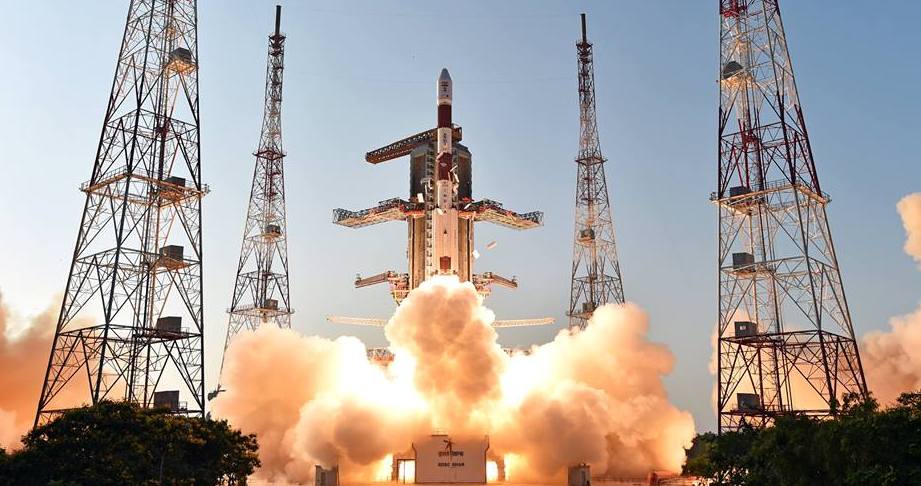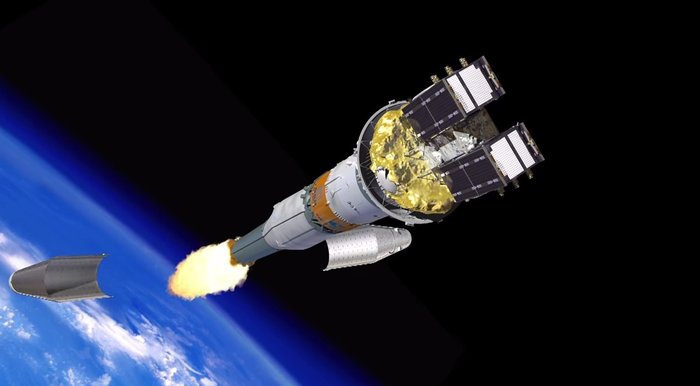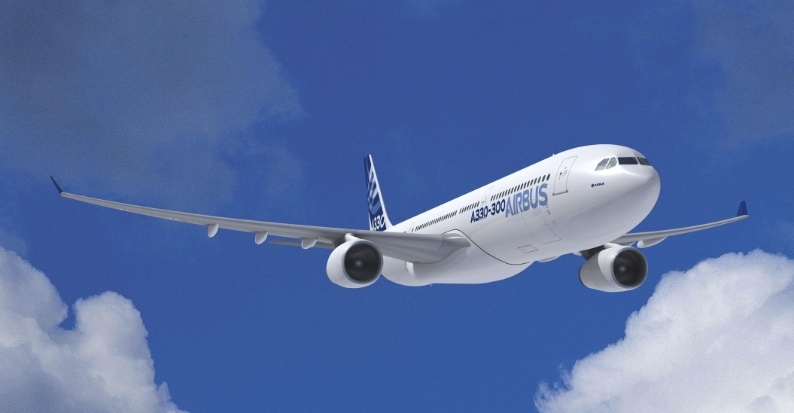
The PSLVC27 rocket blasts off with the IRNSS-1D satellite from Sriharikota on Saturday. An ISRO photo
SRIHARIKOTA (PTI): India is set to operationalise its own navigational system with the successful launch of IRNSS-1D, the fourth in the series of seven navigational satellites, onboard the PSLV-C27 rocket from Sriharikota Saturday.
At the end of the 59.5 hour countdown, PSLV-C27, the time-tested launch vehicle of the Indian Space Research Organisation (ISRO), lifted off from the Satish Dhawan Space Centre at 1719 IST and injected the satellite into orbit about 21 minutes later.
A beaming ISRO Chairman A S Kiran Kumar, for whom this is the first project after taking charge of the space agency, said the mission was successful and the satellite has been placed in precise orbit.
"I congratulate the entire ISRO team for the 28th straight successful PSLV mission which has put the IRNSS-1D, the fourth of the navigation constellation satellite successfully," Kumar said.
He said the PSLV had demonstrated that it had come of age and despite the hiccup in the originally planned launch schedule, which had to be postponed from March 9 due to a problem in one of the sub-systems, "We have had a successful launch today."
With this launch, the country is poised to operationalise the Indian Regional Navigation Satellite System (IRNSS), having put into orbit four of the seven satellites.
"This mission has got significance because we are completing the minimum essential requirement of four satellites in the orbit to start the navigation process," Project Director P Kunhikrishnan said.
IRNSS-1D, which will provide navigation, tracking and mapping service and have a mission life of 10 years, is the fourth in the constellation of seven satellites, planned by ISRO to constitute IRNSS, which would be on par with US-based GPS once the full complement of spacecraft are launched.
While four satellites would be sufficient to start operations of the IRNSS system, the remaining three would make it more accurate and efficient.
In yet another text-book launch and the first mission of ISRO this year, the 44.4 metre tall four-stage Polar Satellite Launch Vehicle with a lift-off mass of 1,425 kg soared into clear sky and released the satellite into its precise orbit as the scientists broke into jubilation.
The XL variant of PSLV, which has six solid rocket strap-on motors to augment the thrust provided by the first stage, was used for the mission, which is the 28th successful flight for the rocket.
This is the eighth time XL version is being used after the Chandrayaan-I, GSAT-12, RISAT-1, IRNSS-1A, Mars Orbiter Spacecraft, IRNSS-1B and IRNSS-1C missions.
The IRNSS system, planned to be completed by this year at a total cost of Rs 1,420 crore, will be targeted at South Asia and is designed to provide accurate position information services to users in the country as well as the region extending up to 1,500 km from its boundary.
Its applications include terrestrial and marine navigation, disaster management, vehicle tracking and fleet management, navigation aide for hikers and travellers, visual and voice navigation for drivers.
The first three satellites in IRNSS series were launched on Jul 1, 2013, April 4 and October 16 last year respectively.
IRNSS system would provide two types of services -- Standard Positioning Service, which is given to all the users, and Restricted Service that is an encrypted service provided only to authorised users.
Kiran Kumar also congratulated the entire ISRO team for bagging the Gandhi Peace Prize.
"This is indeed a big recognition for the work that ISRO has been doing over the decades...I thank the entire nation, the government, the Prime Minister and all the members of the cabinet for reposing faith in ISRO and also recognising its contribution for the societal benefit," he added.
 Previous Article
Previous Article Next Article
Next Article












The Indian Air Force, in its flight trials evaluation report submitted before the Defence Ministry l..
view articleAn insight into the Medium Multi-Role Combat Aircraft competition...
view articleSky enthusiasts can now spot the International Space Station (ISS) commanded by Indian-American astr..
view article